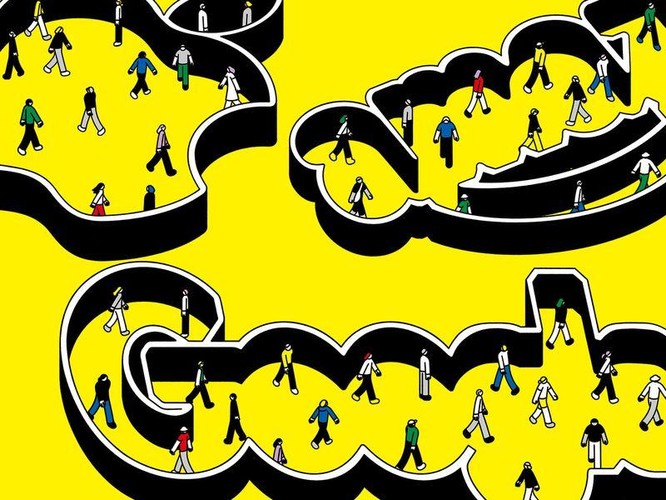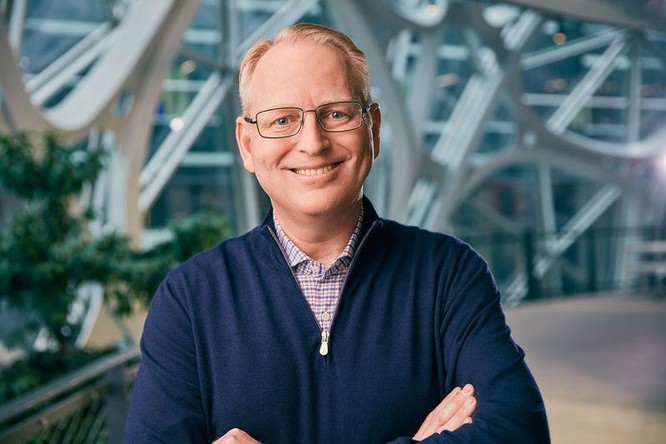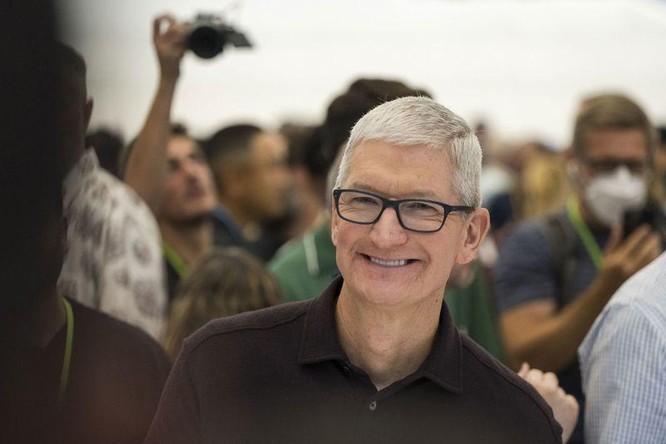The ‘Big Tech’ wants users to choose sides?
- Tram Ho

Photo (Bloomberg)
On the way to work each morning, Amazon Vice President David Limp often asks Amazon Alexa to play Amazon Music in his Mini Cooper, a car made by the car company that has a partnership with Amazon.
In the office, he took notes of meetings on Amazon’s Kindle Scribe. On the way home, he listens to Amazon’s SmartLess podcast, and when he gets home, Amazon’s Echo Show smart screen shows photos of his kids, stored in Amazon’s Prime cloud. When Limp rides his bike, he wears Amazon’s smart glasses: the Echo Frame. And on movie nights with his family, he uses Amazon’s Fire TV.
Limp detailed its loyalty to Amazon’s flagship products launched this year in a live clip on September 28. In this way, he wanted to demonstrate the universal utility of Amazon’s next-generation products, from Echo speakers, Halo sleep trackers to Ring security cameras…all in one place. modern lifestyle.
“There is a paradigm shift in consumer electronics,” he said. “Technology needs to be personalized and intuitive enough to adapt to you and your environment.”

David Limp, Vice President of Amazon (Image: Amazon)
But Amazon.com Inc. does not seem to prioritize reacting to a fact about the technology environment: Consumers often mix and use products.
Prime users can even own Apple devices and Google services. For these consumers, the gradual improvement of devices may not be as important as establishing better connections between the different technology platforms they are forced to live with.
How do the big tech companies solve this problem, while they are pretending that their competitors’ products don’t exist?
Tech giants have long sought to dominate the platform in order to maintain their sales, while at the same time resisting integration with other ecosystems, even though their customers want it. so.
Microsoft Corp., due to concerns about sales of Windows desktop computers, rejected Apple Inc.’s iOS version of Office. and Google’s Android for many years.
Amazon once banned Apple and Google’s streaming TV devices from its online retail store, because the devices “didn’t interact well enough” with Prime Video.
Apple has so far not allowed iMessage to run on Android and Windows, and only launched its music service for Amazon and Google smart speakers after those companies captured about 95% of the US market.
These activities could be tightened further if the economy continues to decline, forcing Big Tech players to protect their sales.
Difficulties began to appear. Market research firm IDC forecasts a 6.5% decline in smartphone shipments in 2022, a decline that Bloomberg once said will cause Apple to cancel plans to increase iPhone production.
Demand for devices such as smart speakers, wearable computers, TVs and streaming devices is also declining, according to IDC.
In the event that Apple, Google and Samsung are forced to reduce production, their strategy will certainly be to extract more money from the existing customer base by up-selling them accessories. and subscriptions that only work within a unique ecosystem – and make it more inconvenient for customers to switch to a competitor’s platform.
An Apple spokesperson countered that the company makes it difficult for users to use competing products, pointing to the synergy of the app store and saying that it is easy for customers to switch device ecosystems. bag.
Meanwhile, representatives from Google and Samsung say that the experience of using Android and Galaxy both supports user choice and is open to integration with partner devices.
IDC analyst David Myhrer highlights that 30% of US households contribute to 71% of Apple’s revenue, meaning that it’s not uncommon to see a person owning more than five Apple devices – like iPhones, iPads , AirPods and MacBooks (not to mention they have to spend money on Apple services like Fitness+ and iCloud). “Having gone into the Apple ecosystem, it was very difficult to come out,” Myhrer said.

Apple CEO Tim Cook (Image: Bloomberg)
Mr. Myhrer believes that Apple’s vast ecosystem is the result of an innovative approach to design, but it is also true that they want customers to be loyal to their ecosystem.
At the iPhone 14 announcement event on September 7, CEO Tim Cook also made a statement quite similar to Amazon’s Limp when promising that the company will offer products that are “unbelievably personal”. ” and “intuition”.
But the desktop demo of the new iPhone model will only feature Apple-made apps, like TV+, Music, and Maps, as if acknowledging the existence of well-known services like Google Maps, Prime Video or Spotify would undermine the world’s most valuable company.
Amazon is similar. They avoid showing competitors’ products during new product launches. Since the company doesn’t make smartphones or laptops, it often shows photos or videos of several people interacting with Amazon’s new software services through some generic, unbranded computer. brand.
The problem with products and services that discourage users from switching ecosystems – aka “lock-ins” – is that it can adversely affect user experience and stifle innovation. .
For example, smart speaker with virtual assistant program. According to a third-party study, Apple now owns the majority of the US smartphone market, while Amazon remains the leader in the smart speaker market. This means that iPhone users will most likely interact with the Echo rather than the HomePod.
But it’s still much easier to sync an iPhone with a HomePod speaker than it is to sync it with a non-Apple device: Simply place your iPhone near the HomePod to begin the setup process.
This mechanism is not available at Amazon, it requires users to download an Alexa app, connect using Bluetooth and Wi-Fi, and complete with a cumbersome setup process.
There is a debate about whether the biggest tech companies should take a less competitive approach. An executive from Tile Inc., a startup that makes locators that attach to keys or other easily lost items, testified before committees of the US Senate and House of Representatives. in 2020 and 2021, says that Apple designs its software in a way that favors its own navigation tools, rather than other stand-alone alternatives.
“ It’s like a football game: You can be the best team in the league, but you have to play away. Your team owns the ball, the stadium and the entire league, they can change the rules of the game in their favor at any time ,” said Kirsten Daru, from Tile, at the time. hours.
In 2021, Apple released AirTags, which function similarly to Tile products. Apple says it designs its products to protect user privacy and that AirTag does not “copy” Tile products.
At this point, the user-driven principle that the tech industry supposedly adheres to should have been accomplished through increased collaboration. That is, it is advisable to let Tile interact with AirTag, or Alexa and Siri can communicate with each other. An Amazon spokesperson said that they do not cause “lock-in” issues, and that the company is full of support for the compatibility of voice assistants across different devices.
If there is a partnership, it usually takes place in an area where no single party dominates or when one company dominates the field to a degree that other companies are forced to follow. Amazon, Apple, Google and Samsung have agreed on a standard Internet-of-things protocol called Matter, which they hope will increase device compatibility.
Mr. Limp also emphasized that more and more cross-platform devices will appear, adding that Apple’s AirPlay is making a collaborative effort on some Fire TV models, and Apple Music can now play on Echo speakers.
“ Sometimes people ask me outright, ‘Are you trying to keep your customers away from these things, ‘ says Limp. “ The answer is no. As soon as we had the opportunity to integrate Apple Music with the Echo, we did it .”
Limp is also certain that the use of the product will become “more mixed” in the future. ” If I didn’t have the Ring app on my iPhone, I wouldn’t be able to see the Ring home camera, ” he said.
Limp even admits that he also loves competing products. He calls his iPhone and MacBook the most important and closest things, because he helped develop the predecessor Macintosh system at Apple in the 1990s.
He also has no interest in entering Alphabet Inc’s hardware territory. ” I don’t think I’ve ever owned a Google product ,” he said.
According to Bloomberg
Source : Genk
